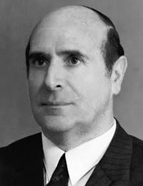

In the foreword to his last published volume, Camões e Pessoa, Poetas da Utopia [Camões and Pessoa, Poets of Utopia], in 1983, he presents a personal reflection on utopia and myth, emphasising that "literature is the quintessential space of utopia," which is why it is often not favoured by established powers, who fear its subversive nature. In his own words, he provides an overview and spiritual testament to his motivations: “I write out of a need to escape, to see more clearly, to extend the practice of reading, to connect with others, to replace life, to feel alive.” Most of the essays in the book focus on the two foremost poets in the Portuguese canon, with the remainder devoted to individual studies of Portuguese and Brazilian authors.
Jacinto do Prado Coelho served as the Director of the Centre for Philological Studies from 1954 to 1965. He became a corresponding member of the Lisbon Academy of Sciences in 1955 and an effective member in 1962, eventually chairing its Classe de Letras (humanities branch). Additionally, he was the president of the Portuguese Writers' Society until it was dissolved by Salazarism in 1965, shortly after Luandino Vieira, an Angolan writer, received the Literature Prize. This episode reveals an important facet of Jacinto do Prado Coelho's sense of citizenship: his quiet yet resolute opposition to the dictatorship, which became evident during the academic crisis of 1962. Co-director and, from 1971, director of the journal Colóquio - Letras at the Calouste Gulbenkian Foundation, his international prestige as a critic and researcher was consolidated from the 1950s onwards due to his regular participation in high-level scientific meetings and publications in renowned international journals. He was a member of the Brazilian Academy of Letters, the Royal Galician Academy, the Hispanic Society of America, the Association Internationale de Littérature Comparée and a founding member of the Portuguese PEN Clube, among other national and international cultural institutions. He also served as vice-president of the Association Internationale des Critiques Littéraires, which he led at its Portuguese Centre.
